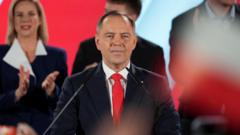In a dramatic election outcome, Karol Nawrocki, a conservative historian, has been declared Poland's new president with 50.9% of the votes, narrowly defeating liberal mayor Rafal Trzaskowski, who garnered 49.1%. This result marks a notable shift in Polish politics, as Nawrocki aims to implement a nationalist agenda while maintaining Poland's sovereignty within the EU framework.
Karol Nawrocki Elected as Poland's New President in a Stunning Turnaround

Karol Nawrocki Elected as Poland's New President in a Stunning Turnaround
Historian Karol Nawrocki takes the presidential seat, edging out rival Trzaskowski in a closely contested election.
With all votes tallied, Karol Nawrocki has emerged as the newly elected president of Poland, securing a narrow victory over his opponent, Rafal Trzaskowski, according to the state electoral commission (PKW). Nawrocki garnered a total of 50.9% of the vote, compared to Trzaskowski's 49.1%. The outcome represents a remarkable reversal from initial exit polls, which indicated a slight lead for Trzaskowski, who had optimistically declared victory earlier in the evening.
Despite the early lead for Trzaskowski, Nawrocki's supporters remained hopeful, and their patience paid off as the final count turned in their favor. "We won, although the phrase 'razor's edge' will forever enter the Polish language and politics," Trzaskowski remarked to his followers, revealing the nail-biting closeness of the race. Nawrocki, previously an unknown figure on the national stage, emerged as an unofficial candidate for the national conservative Law and Justice (PiS) party with a platform emphasizing traditional values and Polish sovereignty.
As Poland's new leader, Nawrocki is expected to deploy his veto power to counteract Prime Minister Donald Tusk's pro-European Union initiatives. This victory may invigorate the PiS party, which has been in opposition for over a year, as they aim toward reclaiming power during the next parliamentary elections.
Nawrocki's stance on international affairs is characterized by support for Ukraine while opposing its NATO and EU membership during ongoing conflicts with Russia. While the presidential role in Poland is largely ceremonial, the president wields significant power to veto legislative proposals, and Tusk's coalition government has thus far struggled to secure a strong parliamentary majority.
Previously in office, conservative incumbent Andrzej Duda congratulated Nawrocki for his "heroic fight until the last minute of the campaign," linked to the country's political direction. The election underscored deep divisions in Polish society regarding its future in the European landscape.
Nawrocki's campaign was not without controversy; he faced scrutiny over the ownership of multiple properties, which raised questions about his engagements with vulnerable citizens. Following the backlash, he pledged to donate a council flat to charity and defended his commitment to providing care to those in need.
As the dust settles, the political landscape in Poland is poised to shift dramatically with Nawrocki at the helm, signaling a renewed focus on national interests and conservative values amidst an evolving European political context.
Despite the early lead for Trzaskowski, Nawrocki's supporters remained hopeful, and their patience paid off as the final count turned in their favor. "We won, although the phrase 'razor's edge' will forever enter the Polish language and politics," Trzaskowski remarked to his followers, revealing the nail-biting closeness of the race. Nawrocki, previously an unknown figure on the national stage, emerged as an unofficial candidate for the national conservative Law and Justice (PiS) party with a platform emphasizing traditional values and Polish sovereignty.
As Poland's new leader, Nawrocki is expected to deploy his veto power to counteract Prime Minister Donald Tusk's pro-European Union initiatives. This victory may invigorate the PiS party, which has been in opposition for over a year, as they aim toward reclaiming power during the next parliamentary elections.
Nawrocki's stance on international affairs is characterized by support for Ukraine while opposing its NATO and EU membership during ongoing conflicts with Russia. While the presidential role in Poland is largely ceremonial, the president wields significant power to veto legislative proposals, and Tusk's coalition government has thus far struggled to secure a strong parliamentary majority.
Previously in office, conservative incumbent Andrzej Duda congratulated Nawrocki for his "heroic fight until the last minute of the campaign," linked to the country's political direction. The election underscored deep divisions in Polish society regarding its future in the European landscape.
Nawrocki's campaign was not without controversy; he faced scrutiny over the ownership of multiple properties, which raised questions about his engagements with vulnerable citizens. Following the backlash, he pledged to donate a council flat to charity and defended his commitment to providing care to those in need.
As the dust settles, the political landscape in Poland is poised to shift dramatically with Nawrocki at the helm, signaling a renewed focus on national interests and conservative values amidst an evolving European political context.
















